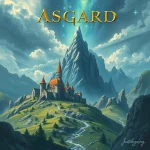
Answer: Cobalt
The cultures around the globe lengthy used myths and superstitions to describe everything on the planet and the skill of mining and metallurgy wasn’t any exception. Centuries ago German miners uncovered veins of ore that appeared as if silver but were hard to smelt and frequently produced virtually no silver along the way. They required to calling the ore and also the metal found within “kobalt” (that was produced from “kobold”).
Kobold may be the German word for goblin and also the miners maintained it had become mischievous goblins that stole the ore they wanted (the missing silver) and replaced it using the ore they didn’t want (the apparently unsmeltable cobalt). The truth is the cobalt only agreed to be intermingled using the silver, without trying by trickster goblins needed. In the 16th century a technique for removing the “kobalt” (“kobold”) was discovered, the name stuck, and once the it made the jump to British it grew to become “cobalt”.

Cobalt isn’t the only metal name we are able to trace to German mythology. The metal nickel also derives its name from German and under nearly identical conditions. Again, German miners found an ore that was similar to the ore they wanted (copper ore) because it shared an identical reddish hue however it wasn’t copper ore but nickel ore. They blamed this mixture on Nickel, a mischievous German spirit, and claimed he grown the “fake” copper there to toy together. They known as the metal “kupfernickel” or “copper nickel” to mirror their belief it had become produced by Nickel. Later once the ore was correctly extracted on its own, the “kupfer” bit was dropped also it was simply known as nickel.
Image thanks to Alchemist-hp.
Resourse: https://howtogeek.com/trivia/which-of-these-metal-derives-its-name-from-german-mythology/

American Gods and Real Norse Myth
Video COMMENTS:
PraecorLoth970: Prof. Crawford, what do you think of Neil Gaiman's "Norse Mythology" book? It is a retelling of several norse myths. I've enjoyed it, but would like your opinion on his accuracy and spirit.
Dane Crowton: Become a Patreon and ask that question.
Danny Hampton: I have a book called Tales of Norse Mythology by A.&E. Keary
Gweilo Xiu: Dr. Crawford, so so cool and informative. Thank you! Ian McShane (who plays Mr. W.) has a habit of picking "Odian" roles. The most implicitly Odian portrayal I have ever seen is Ian McShanes role as Al Swearengen in HBO's series "Deadwood". He plays a straight out badass old west baller who runs the frontier town of Deadwood from behind the scenes, is incredibly witty, crafty, articulate and ambitious. Always seeking more knowledge of his world, always in the depths of some machinations. To the degree that he actually consults with a decapitated head when making difficult decisions. In the process of all of this, the character doles out rough wisdom and advice that feels like a blend of the Havamal and Machiavelli. \n\nIf you haven't seen Deadwood and you are a fan of the Old West and the Odin archetype, you must see this show. It has some of the best dialog of any story put on the screen, big screen or small. A real treat! \n\nOdin (and the entire Norse/Germanic mythical narrative) is a recurrent, implicit, motif in contemporary media. A book or series of videos identifying and discussing the various (implicit and not mentioning anything about the narrative its self, by name) media manifestations of this motif would be a rather awesome read/watch.
Skeggs of Horkabjork: Gweilo Xiu Ian McShane is pretty much Odin! Perfect that he plays Wednesday. Couldn't think of anyone better.
Gweilo Xiu: Skeggs of Horkabjork Right on! Even his little blip on Game of Thrones was amazing, especially for the role it played in a major narrative pivot of a central character (the Hound).
Positive Comment: Fantastic jacket
Kate Elliott: Right?! I can't imagine anyone else carrying it off though.
Funkpanzer: "Linen pants TIED to his legs". This probably means he had wrapped his lower legs with bands of cloth. You typically only did this if you rode a horse, and owning a horse implies wealth. It's not surprising that a god would be described in this way. And of course, he rides Sleipnir. (Thor, on the other hand, rides a chariot pulled by his goats.)\n\nLater it became fashionable for non-riders (i.e. poorer people) to do this, to mimic the clothes of the rich. Like wearing a Ferrari T-shirt even though you drive a Pinto.
Bjowolf2: Not to mention a horse with eight legs (Sleipner) 😉

